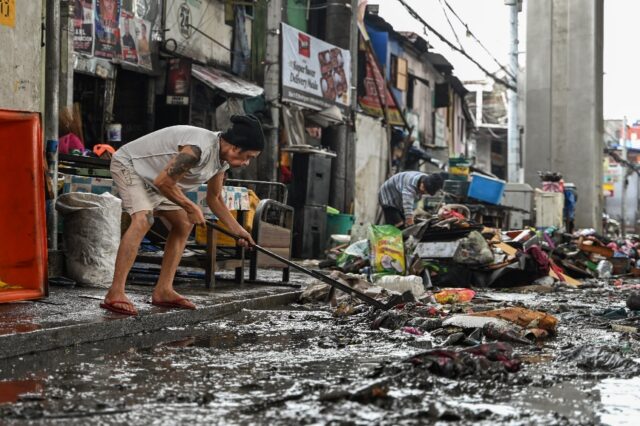Manila street vendor Zenaida Cuerda said Thursday she is “back to zero” after floodwaters washed away the food she sells for a living and swept through her house.
She is one of thousands in the Philippine capital coming to terms with their losses from the relentless rain, after Typhoon Gaemi intensified the seasonal monsoon.
“All my capital is gone. I have nothing now,” Cuerda told AFP, as she wiped away tears outside the concrete house she shares with her sister.
“I don’t have a husband anymore. I can’t rely on my children because they have their own families,” she said.
At least 20 people were killed in Manila and surrounding provinces as the heavy rain triggered floods and landslides.
More than 320 millimetres (12 inches) of rain fell in the capital in the 24 hours to 8:00 am (0000 GMT) on Thursday.
Floodwaters quickly reached chest-height in parts of the city, trapping vehicles and forcing people to use small boats to get around.
When the waters receded, they left behind muddy streets strewn with rubbish and other debris.
As AFP journalists drove around the city on Thursday, mattresses, wooden furniture and bags of rubbish were piled outside houses and shops as people got on with the task of cleaning up.
At the pharmacy where he works, Pedro Parado was still coming to terms with the suddenness of the flooding.
“We couldn’t believe that the floods would be that great. Everyone here was surprised,” Parado, 40, told AFP.
“When the rain poured, we went upstairs. We carried all of our things, including the medicines, so they wouldn’t get wet.”
President Ferdinand Marcos joined relief efforts on Thursday, handing out food parcels to people hardest hit by the floods who also tend to be the city’s poorest.
Marcos said more areas of the city were flooded than when Typhoon Ketsana, known in the Philippines as Tropical Storm Ondoy, hit in 2009.
“The amount of water was as not as bad as Ondoy, but the effect was greater than Ondoy,” Marcos said in a hard-scrabble neighbourhood near Manila Bay.
“This is what the effects of climate change are.”
Despite having experienced flooding in the past, Cuerda thought she would avoid it this time after authorities deepened the river next to her house.
“We really thought we weren’t going to be flooded,” she said.
“Everything was so sudden. We’re now back to zero. It’s always like this.”

COMMENTS
Please let us know if you're having issues with commenting.